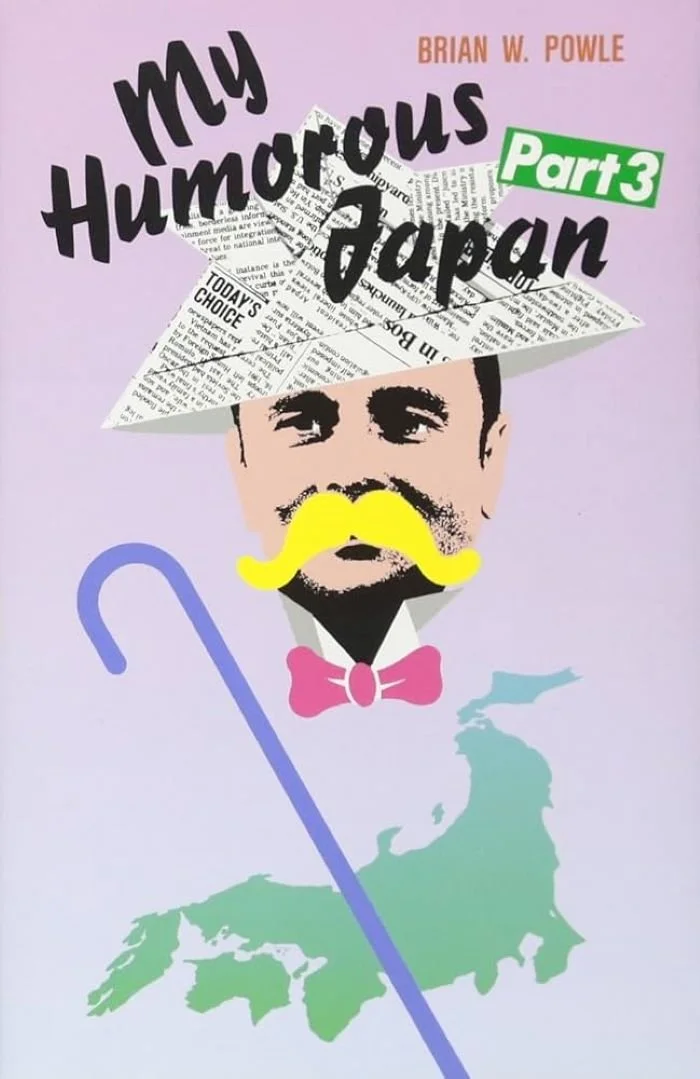My Humorous Japan Part 3 by Brian W. Powle (NHK Shuppan)
Brian W. Powle is a British citizen and teacher who taught at Aoyama Gakuin in Tokyo for many years. He has published a number of textbooks for high schools and universities and has also appeared on NHK radio and television, as well as contributing articles to newspapers. He says that he tries to be an entertainer as well as a teacher. It’s his belief that “If students can laugh and enjoy themselves while learning English, so much the better”.
My Humorous Japan Part 3 is Powle’s third book on what he finds amusing and humorous about living in Japan. As much as I would have liked to feature Parts 1 and 2, only Part 3 was available at my local library.
Part 3 was first published in 1997 so some of the content that was current at the time of publication may seem a bit dated now. However many of the topics are still relevant today, such as school bullying and train pests, more commonly known in Japan as chikan (which is usually translated as pervert and refers to people, mostly men, who molest women on crowded trains).
As a long-time resident of Japan myself, I find Powle’s experience quite similar to my own. His first essay in this collection is about the obatalian. The term isn’t used as often now but the actions of the obatalian haven't changed.
So who and what are obatalians. They’re usually middle-aged women from about forty to elderly women in their eighties and nineties. Powle points out that there are many theories about the origin of the word and how some people think it should be spelt obattalion as the word combines “obasan” (aunt or older woman) and “battalion” and “we get an aggressive middle-aged lady who looks something like a fighting soldier”.
They’re the kind of women who rush on to the train to grab the last available seat. They talk loudly in public complaining about their daughter-in-laws. They often stand and talk to their other obatalian friends in the pool, getting in the way of others who actually want to swim. They may also be tight with their husbands’ allowance. Thankfully, my wife doesn’t fit into the description of an obatalian.
One of my favorite essays of Powles is titled My Strange Experience at a Hot Spring Resort. Japan is famous for its hot springs and ryokans (traditional Japanese inns). There’s nothing better than soaking in a hot bath to get rid of all your anxieties. Some baths may be located near a natural river or waterfall.
Powle was telling the proprietor of the inn about how much he enjoyed the nice sound of the waterfall that made him fall blissfully asleep. However, the woman told him “that was not the sound of the waterfall. The toilet next door is out of order. The water won’t stop running. That’s what you heard”. Needless to say, Powle could not fall asleep the next evening as his perception of a nice waterfall was replaced by the image of a broken toilet!
Even today, many visitors to Japan are not sure what to make of the Japanese toilet. The old traditional squat toilets have been replaced by washlets, toilets with a computer console that some people find as confusing as the cockpit of an airplane. Imagine if you’re a man and press the button for bidet instead of oshiri (the Japanese term for your backside).
Aside from the two essays mentioned above, the book includes sixteen other stories of Powle’s experience in Japan with titles like Why Do Foreigners Get Angry in Japanese Barbershops and A Fortune Teller Who Couldn’t Predict Her Own Death.
It’s very light reading for the Japanophile and will give you a glimpse of what it’s like to live in Japan as seen through the eyes of a foreigner. Also, it’s just entertaining. ~Ernie Hoyt
